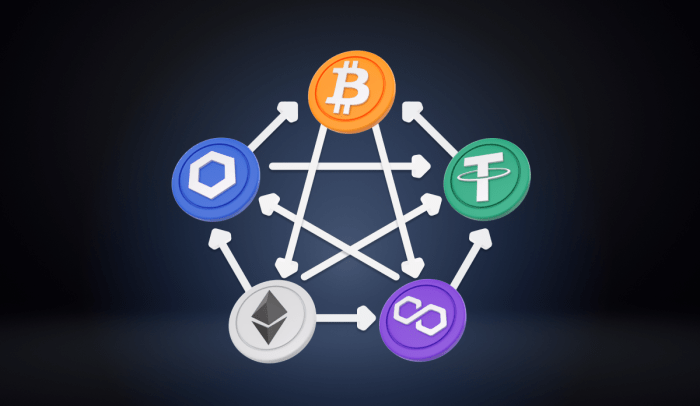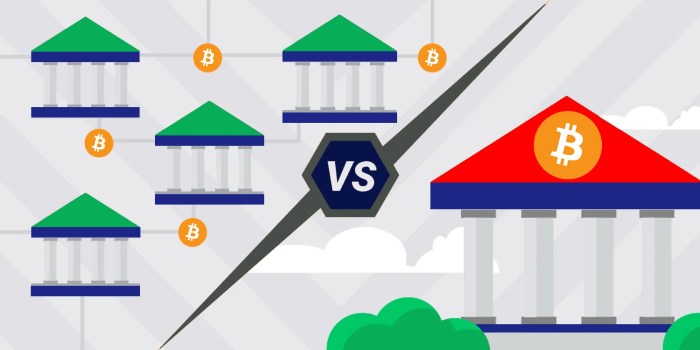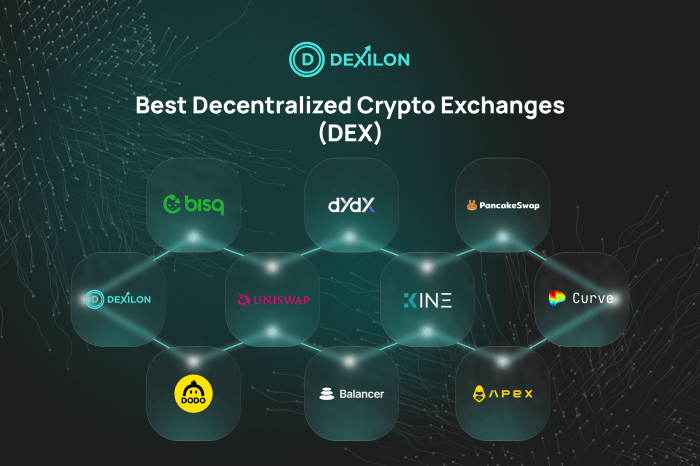Kicking off with The Role of Decentralized Exchanges in the Crypto Space, this opening paragraph is designed to captivate and engage the readers, setting the tone american high school hip style that unfolds with each word.
When it comes to the world of cryptocurrency, decentralized exchanges play a crucial role in reshaping how we trade and invest in digital assets. These platforms offer a level of freedom and control that centralized exchanges simply can’t match, revolutionizing the way we interact with the crypto space. Get ready to dive deep into the world of decentralized exchanges and discover their impact on the ever-evolving crypto ecosystem.
Introduction to Decentralized Exchanges: The Role Of Decentralized Exchanges In The Crypto Space
Decentralized exchanges, often referred to as DEXs, are platforms that allow users to trade cryptocurrencies directly with each other without the need for intermediaries like a central authority. Unlike centralized exchanges that hold users’ funds and require KYC verification, DEXs operate on blockchain technology, enabling peer-to-peer transactions securely and anonymously.
Key Features of Decentralized Exchanges
- No Custodianship: Users retain control of their funds throughout the trading process.
- Privacy and Anonymity: Users can trade without disclosing personal information.
- Security: Transactions are executed on the blockchain, reducing the risk of hacks or theft.
- Global Accessibility: Anyone with an internet connection can access DEXs.
Popular Decentralized Exchanges
- Uniswap: Known for its automated market maker (AMM) system, Uniswap has become one of the most popular DEXs in the crypto space.
- SushiSwap: A fork of Uniswap, SushiSwap offers additional features like yield farming and staking.
- Balancer: Balancer allows users to create liquidity pools with multiple tokens and set their own fees.
Advantages of Decentralized Exchanges

Decentralized exchanges offer a range of benefits for traders and investors in the crypto space. From enhanced security to financial inclusivity, these platforms are changing the game in the world of digital assets.
Enhanced Security
Decentralized exchanges provide a higher level of security compared to their centralized counterparts. By eliminating the need for a central authority to hold users’ funds, decentralized exchanges reduce the risk of hacking and theft. This gives traders peace of mind knowing that they have more control over their assets.
Financial Inclusivity, The Role of Decentralized Exchanges in the Crypto Space
Decentralized exchanges promote financial inclusivity by allowing users from all over the world to participate in trading without the need for a third party intermediary. This opens up opportunities for individuals who may not have access to traditional banking systems or face restrictions in their countries.
Transparency
One of the key advantages of decentralized exchanges is the transparency they offer. Transactions are recorded on a public blockchain, allowing users to verify and track their trades in real-time. This transparency builds trust among users and promotes a more open and honest trading environment in the crypto space.
Challenges Faced by Decentralized Exchanges

Decentralized exchanges, while offering numerous advantages, also face several challenges in the crypto space. These obstacles can impact the overall functionality and adoption of decentralized exchange platforms.
Liquidity Issues
Liquidity is a major challenge for decentralized exchanges, as they often struggle to match the trading volume seen on centralized exchanges. This lack of liquidity can result in slippage and higher transaction costs for users, making it less attractive to trade on these platforms.
Speed Concerns
Another challenge faced by decentralized exchanges is speed. Transactions on decentralized exchanges can be slower compared to centralized exchanges due to the consensus mechanisms and blockchain technology they rely on. This can lead to delays in order execution and decreased user satisfaction.
User Experience
User experience is a crucial aspect that decentralized exchanges need to improve upon. The complexity of using decentralized platforms, including managing private keys and interacting with smart contracts, can be daunting for novice users. Enhancing user interfaces and providing better guidance can help address this challenge.
Regulatory and Compliance Issues
Decentralized exchanges also grapple with regulatory challenges and compliance issues globally. The lack of clear regulatory frameworks for decentralized exchanges in many jurisdictions creates uncertainty for both operators and users. Ensuring compliance with anti-money laundering (AML) and know your customer (KYC) regulations can be particularly challenging for decentralized exchanges.
Role of Decentralized Exchanges in Promoting Decentralization

Decentralized exchanges play a crucial role in promoting decentralization within the crypto market by providing users with the ability to trade directly with each other without the need for intermediaries like centralized exchanges. This not only gives users more control over their assets but also reduces the risk of censorship and manipulation.
Empowering Users with Full Control
Decentralized exchanges empower users to have full control over their assets by allowing them to hold their private keys and make trades directly from their wallets. This eliminates the need to deposit funds into exchange-controlled wallets, reducing the risk of losing assets due to hacks or exchange failures. Users can trade securely while maintaining ownership and control over their funds.
Fostering a Democratic and Censorship-Resistant Financial System
By enabling peer-to-peer trading without the need for a central authority, decentralized exchanges contribute to the creation of a more democratic and censorship-resistant financial system. Users can transact freely without the fear of having their accounts frozen or transactions blocked by a central entity. This promotes financial inclusivity and empowers individuals to participate in the global economy without restrictions.



